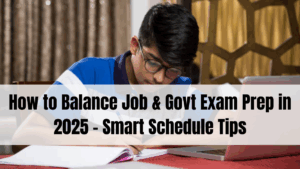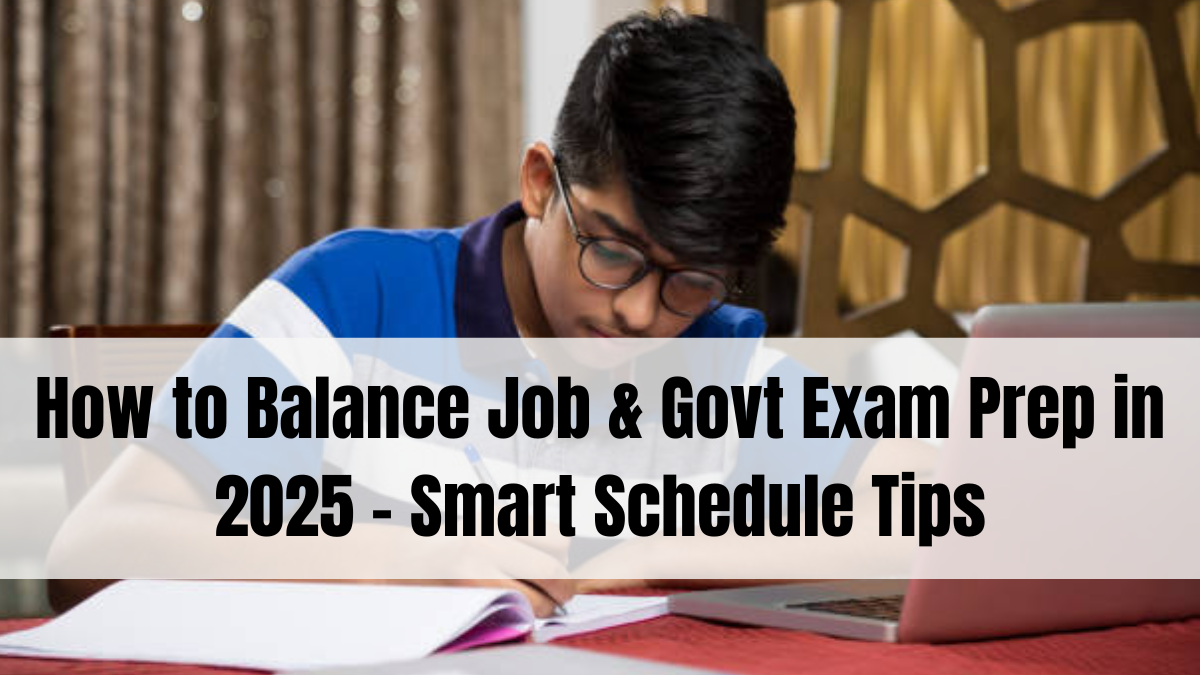Balancing a full-time job with preparation for competitive government exams in 2025 can be daunting but entirely achievable with the right approach. For working professionals aiming to crack exams like UPSC, SSC, or banking, effective time management and strategic planning are the keys to success.
This guide shares expert govt exam prep working professionals 2025 tips to help you optimize your study time without compromising work or personal life.

Understanding the Challenges
Working professionals face unique hurdles:
-
Limited time for daily study due to office hours.
-
Mental fatigue affecting focus and retention.
-
Difficulty in maintaining consistent study routines.
-
Balancing family, work, and exam preparation demands.
Recognizing these challenges helps in crafting realistic, sustainable strategies.
Creating a Flexible and Realistic Study Schedule
-
Assess your available time: Identify free slots during mornings, evenings, and weekends.
-
Set achievable goals: Break syllabus into weekly and monthly targets rather than daily pressures.
-
Prioritize topics: Focus on high-weightage and weak areas first.
-
Incorporate micro-learning: Use short study bursts (15–30 minutes) during breaks or commutes.
-
Plan buffer days: Allocate extra days for revision or unforeseen work commitments.
Digital planners and apps like Google Calendar or Todoist can help track and adjust schedules dynamically.
Effective Study Techniques for Busy Professionals
-
Active learning: Engage with quizzes, flashcards, and mock tests rather than passive reading.
-
Use audio resources: Podcasts and recorded lectures can be consumed during travel or chores.
-
Leverage online courses: Flexible timing allows access to coaching and tutorials anytime.
-
Group studies or peer learning: Weekend sessions or online groups can boost motivation and clarify doubts.
-
Regular revision: Schedule periodic review sessions to reinforce memory.
These methods maximize learning efficiency in limited time.
Maintaining Work-Life-Study Balance
-
Set boundaries: Inform family and colleagues about your exam goals to gain support.
-
Manage stress: Incorporate relaxation techniques such as meditation or light exercise.
-
Maintain health: Prioritize sleep, balanced nutrition, and physical activity.
-
Celebrate small wins: Reward yourself after meeting milestones to stay motivated.
-
Avoid burnout: Recognize signs of fatigue and take necessary breaks.
Balance ensures sustained productivity and well-being.
Utilizing Technology and Resources
-
Mobile apps like Gradeup, Testbook, and Unacademy offer customized mock tests and study material suited for flexible learning.
-
Use digital note-taking tools like Evernote or OneNote for organized study content.
-
Join online forums and Telegram groups for peer support and updates.
-
Automate reminders for deadlines and tests.
Smart use of technology bridges time constraints and resource gaps.
Inspirational Success Stories
Many working professionals have cracked government exams by adopting disciplined routines, leveraging part-time coaching, and staying focused despite challenges. Their journeys highlight the importance of consistency, self-belief, and adaptive planning.
FAQs
How many hours should working professionals study daily?
Even 2–3 focused hours daily can be effective with the right techniques and planning.
Can I prepare for competitive exams while working full-time?
Yes, with disciplined scheduling, efficient study methods, and support systems.
How do I avoid burnout juggling work and studies?
Maintain a balanced routine, take regular breaks, and practice stress-relief activities.
Are online coaching classes helpful for working aspirants?
Absolutely; they offer flexibility and access to quality resources anytime.
What should I prioritize if study time is limited?
Focus on high-yield topics, practice mock tests, and revise regularly.
Click here to know more.
